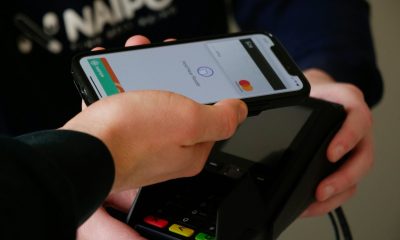Fintech
Mercado Pago: Fintech Leverages Interest Rates to Compete with Brokerage Firms
Mercado Pago launched its credit card a few months ago, after last year obtaining authorization from the National Banking and Securities Commission (CNBV) to operate as an Electronic Payment Fund Institution (IFPE). In the first three months since its launch, Mercado Pago has placed 150,000 cards in the Mexican market, equivalent to 10% of the credit cards issued in that period in the country.

The high-interest rates of central banks position financial technology institutions (fintech) as a serious competitor to brokerage firms, according to Mercado Pago.
“The fact that interest rates are high allows us to give a better yield to our clients. We have the capacity to distribute that product to a lot of people,” said Pedro Rivas, general manager of Mercado Pago in Mexico, in an interview.
Rivas explained that fintech companies have two competitive advantages: the use of technology in the development of financial products and their user base.
“Since we have millions of users who are constantly interacting with our products, we avoid the cost (of reach) that brokerage firms have,” said Rivas.
Mercado Pago currently pays a 10.3% annual rate of return on the savings that a person deposits in his application. In other words, with an investment of 20,000 pesos, the return will be 2,000 pesos.
The money is deposited in a fund managed by Grupo Bursátil Mexicano (GBM), which has more than 1,500 million pesos invested with figures updated to May of this year.
Read more about Mercado Pago and find the latest financial news of the day with the Born2Invest mobile app.
Fintech investment accounts scale
In a meeting with the media, Tenet Consultores partner, Rocío H. Robles, explained that in the four years of the Fintech Law, more and more people are using these entities to invest.
“The number of investor accounts in crowdfunding institutions has grown more than that of brokerage firms, considering that the latter have been operating for many years,” she said.
According to the most recent data from the Association of Crowdfunding Platforms (Afico), at the end of 2022, there were around 800,000 investment accounts in crowdfunding platforms.
Meanwhile, accounts in brokerage firms are around 6 million, a number that has increased since the pandemic, although such institutions are more long-lived than fintechs.
Mercado Pago evaluates risks due to delinquency
Mercado Pago launched its credit card a few months ago, after last year obtaining authorization from the National Banking and Securities Commission (CNBV) to operate as an Electronic Payment Fund Institution (IFPE).
In an environment of high interest rates, which make access to credit more expensive, the company reviews the risks of default, which affect fintech companies more than traditional banks.
“We are not grabbing the user who we don’t know whether or not he will be able to pay a loan. We have been training our risk models for a long time, we have a lot of information available, around 2,000 variables,” said Rivas.
In order to avoid these problems, the fintech company evaluates the payment habits of the users who are part of its digital ecosystem, to rule out those who could default on their payments.
However, the case of Mercado Pago, the financial arm of e-commerce giant Mercado Libre, is not the same as that faced by smaller entities that are more vulnerable to high-interest rates.
This is an additional product that adds value to a good part of our users, but we are not solely dependent on it. If there is a downturn we do not depend on this to live or die,” said the director of Mercado Pago.
In the first three months since its launch, Mercado Pago has placed 150,000 cards in the Mexican market, equivalent to 10% of the credit cards issued in that period in the country.
__
(Featured image by rupixen.com via Unsplash)
DISCLAIMER: This article was written by a third party contributor and does not reflect the opinion of Born2Invest, its management, staff or its associates. Please review our disclaimer for more information.
This article may include forward-looking statements. These forward-looking statements generally are identified by the words “believe,” “project,” “estimate,” “become,” “plan,” “will,” and similar expressions. These forward-looking statements involve known and unknown risks as well as uncertainties, including those discussed in the following cautionary statements and elsewhere in this article and on this site. Although the Company may believe that its expectations are based on reasonable assumptions, the actual results that the Company may achieve may differ materially from any forward-looking statements, which reflect the opinions of the management of the Company only as of the date hereof. Additionally, please make sure to read these important disclosures.
First published in EL CEO. A third-party contributor translated and adapted the article from the original. In case of discrepancy, the original will prevail.
Although we made reasonable efforts to provide accurate translations, some parts may be incorrect. Born2Invest assumes no responsibility for errors, omissions or ambiguities in the translations provided on this website. Any person or entity relying on translated content does so at their own risk. Born2Invest is not responsible for losses caused by such reliance on the accuracy or reliability of translated information. If you wish to report an error or inaccuracy in the translation, we encourage you to contact us

-

 Crypto1 week ago
Crypto1 week agoXRP vs. Litecoin: The Race for the Next Crypto ETF Heats Up
-

 Biotech4 days ago
Biotech4 days agoSpain Invests €126.9M in Groundbreaking EU Health Innovation Project Med4Cure
-

 Crypto2 weeks ago
Crypto2 weeks agoRipple Launches EVM Sidechain to Boost XRP in DeFi
-

 Biotech7 hours ago
Biotech7 hours agoAdvancing Sarcoma Treatment: CAR-T Cell Therapy Offers Hope for Rare Tumors
























